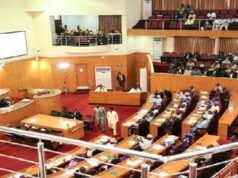
Most of Nigerian Muslims are already in the Holy land of Saudi Arabia for this year’s pilgrimage. They are all in the blessed lands of Makkah and Madinah, ready to fulfil this divine obligation at the Two Holy Mosques. Yet, behind the grandeur, garbs, and symbolism of Hajj, lies a disturbing contradiction in the country’s socio-economic and political landscape. Many ignorant people embark on Hajj without equipping themselves with the basic knowledge of Islam, including the essence of Hajj and the minimum expected manifestation of the fear of Allah (Taqwa).
Recently, villains, bandits and charlatans were seen donning sacred garb, both in Nigeria and Saudi Arabia. Yahaya Zango, a wanted bandit linked to multiple kidnappings in northern Nigeria, was arrested at the Hajj camp in Abuja during screening. Similarly, Sani Galadi, connected to abductions in Kogi state and Abuja, was apprehended at the Sultan Abubakar International Airport in Sokoto while preparing for pilgrimage. These arrests expose a disturbing trend!
The purpose of this piece is to highlight how crucial it is for many Muslims to obtain a foundational education in Islam before hastily completing the Hajj.
The five pillars of Islam form the foundation of a Muslim’s faith and practice. The first is the Shahadah, the declaration that there is no god but Allah and that Muhammad (peace be upon him) is His Messenger. The second is Sallah, performing five daily prayers that strengthen a Muslim’s connection and devotion to Allah. The third is Zakah, giving a portion of one’s wealth to the needy, promoting social equity. The fourth is Sawm, fasting during Ramadan to build self-discipline, power of restraint and spiritual awareness. The fifth pillar is Hajj, the sacred pilgrimage to Makkah, which is required once in a lifetime for every Muslim who is physically and financially able.
The Hajj’s designation as the fifth pillar of Islam is interesting; this chronological order is intentional and highly symbolic. Allah offers precise instructions in the Qur’an for those who wish to embark on this profound journey.
“Pilgrimage to this House is an obligation by Allah upon whoever is able among the people. But whoever disbelieves – then indeed, Allah is free from need of the worlds. (Qur’an 3:97)
“And take provisions, but indeed, the best provision is Taqwa (God-consciousness). So, fear Me, O you of understanding (Qur’an 2:197).”
The Prophet Muhammad (peace be upon him) reminds us: “Allah is Pure and only accepts what is pure.” (Sahih Muslim).
Both the verses of the Qur’an and the sayings of the Prophet (peace be upon him) collectively instruct pilgrims, before, during, and after Hajj, to take essential provisions such as knowledge, fear of Allah, and inner purity. However, they emphasise that the best provision for the journey is Taqwa (God-consciousness), which should be wrapped in knowledge and sincerity.
The guidance further urges those with understanding to cultivate a deep fear and reverence for Allah, as this is the true mark of a successful pilgrim.
For many Nigerians, the Hajj has regrettably devolved into an annual ritual and a form of religious tourism that lacks introspection and self-purification. In an ill-informed and desperate attempt, Nigerians rush to “stone the devil” while still endorsing the devil’s schemes and antics.
Professional politicians at different levels in Nigeria who embezzle public funds, unleash bad governance on the rest of us, and deny their constituents basic amenities line up to perform the Hajj with it.
After hurting countless souls, businesspeople who take advantage of the masses by selling substandard goods, charging exorbitant prices, and dishonesty come to Makkah to “stone the devil.”
In addition to lying to the public, abusing their power, and taking bribes to carry out their paid responsibilities, civil servants who are tasked with overseeing government institutions and structures also aspire to become Alhajis and Alhajas with obscene wealth.
The half-educated Islamic scholars and the mischievous among the well-educated ones are culpable. These marabouts and alfas embolden civil servants and politicians to “stone the devil,” falsely assuring them that all their sins and atrocities will be forgiven. Who are they deceiving? The principles of repentance (Tawbah) regarding stolen wealth are clear in Islam: the entire stolen wealth must be returned.
Physicians, nurses, and pharmacists who divert patients from government hospitals to their private clinics to profit from them or who steal drugs meant for the poor are also part of the charlatans in the medical profession running to Makkah to “stone the devil,”. Unfortunately, a large number of these medical officers have made quick fortunes by associating with dishonest officials at government hospitals.
In schools, exam administrators, teachers, and principals who enable malpractice and operate so-called “miracle centres” take unethical breaks, only to embark on Hajj as if the pilgrimage will cleanse their misconduct.
Contractors who construct deadly roads and collapsing buildings using substandard materials also find time to perform the rites of Hajj, hoping that tawaf and the stoning of the devil will somehow absolve them of their greed and negligence. The list of such violations against the sanctity of Hajj is countless, reflecting a deeper crisis of hypocrisy and moral decay cloaked in religious rituals.
Even drug traffickers of narcotics and human traffickers now don the sacred garments of Hajj, hoping to mask their crimes with pilgrimage while defiling its sanctity.

Next are the merchants of death—the contractors who construct deadly roads and highways, build substandard airport runways, and erect public buildings with inferior materials. Yet, they still find time to answer the call of Hajj, perhaps hoping that tawaf and the stoning rites will somehow cleanse the corruption of their hands. The list of such abuses against the sanctity of Hajj is endless, exposing a dangerous trend of using sacred rituals to mask moral bankruptcy.
This is not an attack on the ritual of Hajj—a pillar of Islam and a spiritual pinnacle for every true believer. The writer is himself a firm believer in Islam, in the purifying power of Hajj, and the boundless mercy of Allah. However, the record must be set straight. This is, rather, a wake-up call: Islam is a complete and comprehensive way of life, and ‘Ibadah (worship). Hajj should not be demonised or reduced to a gathering of thieves and vultures! There can be no genuine spiritual cleansing without sincere repentance, no acceptance without purity, and no meaningful transformation without knowledge.
Nigerian Muslims must revive the spirit of genuine submission to Allah to return to the core tenets of their faith, not just through external rites. The foundation of it is a profound comprehension of Tawheed, the Oneness of Allah, which influences every facet of a believer’s existence. It demands integrity in business, where profit is never sacrificed for honesty. It calls for justice in governance, where authority is used responsibly and fairly. It demands that morality be taught in schools, moulding students’ minds with virtue rather than vice. To ensure that every citizen is treated with dignity, it exhorts us to advance mercy and justice in public service. It pushes us to create families that are based on discipline, compassion, and faith. And when we do the Hajj, let it be with legal income, a cleansed heart, and a character that has been genuinely changed by Islam’s teachings—not just a trip to Makkah, but a return to righteousness.
Until we live Islam before performing its rituals, our journeys to Makkah may remain nothing but costly charades. Let us not be deceived. You cannot stone the devil in Makkah while dining with him in Nigeria.
We pray that Allah will give us the wisdom, sincerity, and Taqwa to be Muslims in thought, word, and deed, not just in name. To all sincere Nigerian pilgrims starting the holy Hajj journey, may Allah accept your journey and grant you Hajj Mabrur, a Hajj that is acknowledged, transformative, and rewarded with forgiveness and rejuvenation. I hope your prayers are heard, your hearts are cleansed, and you return with a stronger faith and a more moral lifestyle. AMEN.
*Dr. Lukman Raimi, PhD, LL.M, MNIM is an entrepreneurship educator, legal researcher, and good governance advocate.






